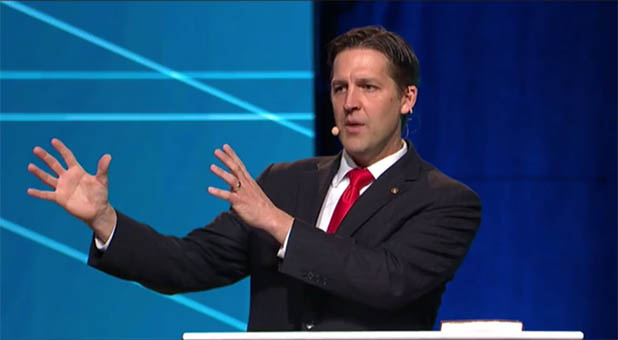U.S. Senator Discusses Being a Christian Witness
In an age of continuous economic disruption and social fragmentation, what can possibly hold society together?
Many are quick to turn to politics for such answers, pushing for increased price controls, trade barriers and subsidies to prevent or mitigate the effects of such change. Others are just as quick to shrug off the disruption altogether, encouraging faith in “economic progress” and the enduring promise of productivity.
But while the recent waves of economic disruption have surely brought their share of opportunity and economic blessings, the march forward ought not to be so blind. Indeed, even if we tend toward a sunny view of our economic future (and I do), we’d do well to ask ourselves what, exactly, such “progress” should like—both materially and spiritually—and how or whether it might be pursued and achieved.
In a recent talk at TGC 2017, Senator Ben Sasse explores those questions at length, tailoring his message specifically to Christians and the role of the church amid rapid change. See the video above.
“Politics can only work well if it’s a framework and not the center,” he explains, noting the importance of the family, the church and the various mediating institutions of society. The American experiment is one whose roots begin with a flat rejection of politics as problem-solver-in-chief.
And yet even if we understand that politics isn’t the answer, we still need a proper view of those other foundational features of a flourishing society. Even as we remind ourselves of the limits of princes and kings, we also ought to remember the limits of a civil society outside the power of the gospel.
The quest to build Babel doesn’t just rest in the halls of political power. In our families, businesses and social institutions, Christians have the responsibility to carry with us far more than mere moralism or Tocquevillian social engineering. The ultimate aim of our activity points toward something else.
Sasse emphasizes the need to have “guard rails” in our hearts and a “cultural awareness” that “we’re a forgetful people,” particularly when it comes to the successes we can achieve here on earth. It’s the story we see throughout the Bible, from Genesis to Revelation, whether in the Israelites’ constant pursuit of an earthly kingdom or the disciples’ illusions about what Christ’s coming reign would actually look like.
“We have always yearned to have a city that had foundations. We’ve always wanted to make it happen in the here and now,” Sasse says. “This whole [biblical] text is stories of our forgetfulness and our hope that the kingdom would come soon and that it would be a worldly kingdom.”
Those desires are understandably “natural,” but Sasse reminds us that “the king that you yearn for is supernatural.” If we hope to redeem and restore civil society, never mind the halls of political power, we have to embrace and assume that basic orientation:
And it is our calling and it is your calling to preach to ourselves—to preach to our congregations, to preach to our kids, to preach to our neighbors—to recognize all of this ambassadorial language throughout our text … We have the task of setting up an embassy that says, “Your yearning for a city that has foundations is natural, but the king that you yearn for is supernatural, and he is coming again, and he is a liberator, and he has actually already arrived on a distant shore.”
This is not a Platonic dualism of the material vs. the spiritual world. This is … about the future kingdom breaking into the present evil age. The dualism that we know is the dualism between this evil age where we think by our own power we can establish security and comfort and happiness and hope and durable jobs and stable families and true community and loving neighbors that are always reconciled and reconciling. And what really is our hope is the Messiah who comes and who breaks in and … announces all the truths of the kingdom that is to come, of the New Jerusalem, of the city that has foundations.
When we grab hold of our true callings as dual citizens and ambassadors for Christ, we are equipped to bring a true vision of freedom across all spheres of society, not just government. With this at the forefront of our cultural imaginations, we work not only toward a political witness that accurately discerns between Washington and Jerusalem, but we also see new ways of sowing seeds at the ground level of culture and civilization.
Acting in and through that lens, we prepare ourselves to meet social and economic disruption with courage, boldness and love. Rather than turning to earthly mechanisms out of fear, we seize the tools and institutions God has given us, stewarding them to spread the joy and freedom and glory of the coming age in the here and now.
Joseph Sunde is a writer and project coordinator for the Acton Institute, serving as editor of the Letters to the Exiles blog and content manager of the Oikonomia channel at Patheos.com. He is the founder of Remnant Culture and was a longtime contributor to AEI’s Values & Capitalism project.
This article was originally published at Acton.org. Used with permission.




























































